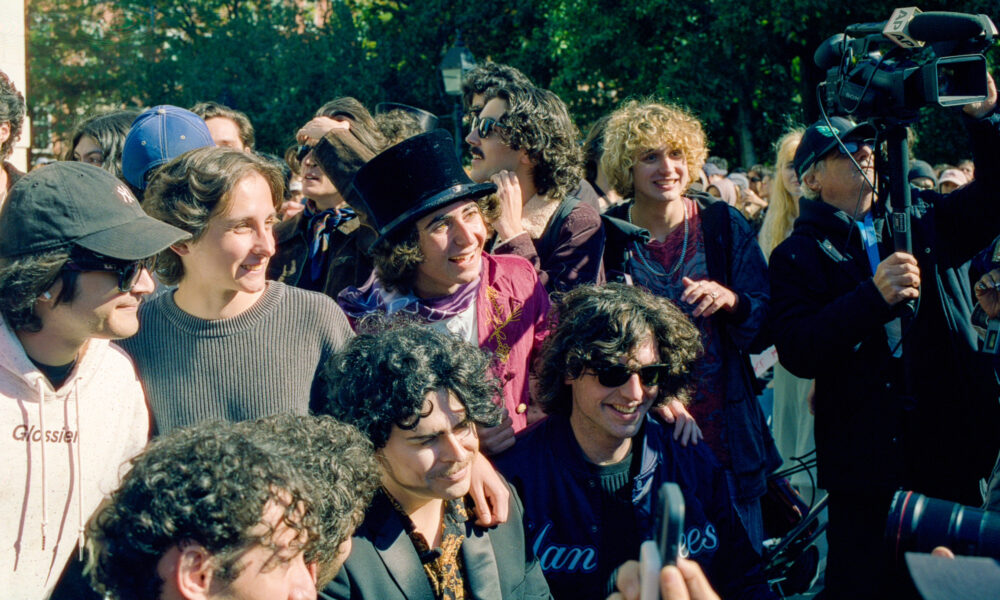And the autumn night when we realized
We were falling out of love
There were some things that were said that weren’t meant
Do these lyrics hit a little too close to home? Well, American Football’s self-titled, debut studio album, retrospectively known as LP1 is just for you. American Football is a Midwest emo band originating in Urbana, Illinois. Led by frontman Mike Kinsella, they released LP1 in September 1999 — a record that paved the way for many of the melancholic emo records we know and love today.
LP1 does it all right. It’s the shoulder you cry on, but the one that hits your back a little too hard when you’re having a coughing fit. To truly understand what makes LP1 stand out, you have to understand the genre at large.
The lust for sadness present in moody teenagers inevitably brought about emo — a loud, emotional genre stemming from hardcore punk. While emo does have the same anarchic ideology as its punk predecessors, the music is often more focused on the artist’s hate towards their high school ex-partner who probably moved on years ago. The first emo bands originated around the 1980s in Washington, D.C., with bands such as Embrace, Fugazi and Rites of Spring being credited with starting the genre. It’s also worth noting that this genre of music wasn’t always called emo. Originally, many considered emo an altered version of hardcore, a genre more closely associated with punk. Thrasher Magazine used “emotional hardcore” in a 1986 issue, but the term was eventually shortened to “emo-core.” Ian Mackaye of Fugazi called emo-core “the stupidest fucking thing I’ve ever heard in my entire life.”
This hardcore era of emo is known as “first-wave emo.” That’s right — emo comes in waves, and there are more installments than Lord of the Rings. From first-wave emo arises its dorky cousin, Midwest emo, also known as second-wave emo. Midwest emo is a subgenre that has the same emotional themes as emo but shifts away from its hardcore punk origin and instead takes inspiration from math rock, a style of rock characterized by complex rhythmic structures — like if a rock star took a jazz class. If you’ve ever two-stepped to names such as Cap’n Jazz, Mineral or Sunny Day Real Estate, you’ve danced to Midwest emo. It attracts listeners with its crisp approach to sadness. The band that brought together many of the angsty teens in the ‘90s through the sound of Midwest emo is no other than American Football.
Third-wave emo came in the early 2000s, where pop-punk and emo intertwined. It’s unimportant to American Football’s history though — so save that for a Google search later. Fourth-wave emo, known as emo revival, is what most teenagers today are familiar with. If you’re wondering why everyone who bullied emos a decade ago now posts Death Cup by Mom Jeans on their Instagram notes, you can thank fourth-wave emo. This genre takes heavy inspiration from Midwest emo and blends it with indie rock. Among the excitement surrounding the mid-2010s emo revival, fans dug up the decade-old LP1. The contemporary style of LP1 is what makes it as loved as it is today, influencing modern artists you may have cried to, such as Title Fight, Modern Baseball and TRSH.
Though American Football’s sound is unique, bands such as Slowdive, Red House Painters and Tortoise helped mold it. The slow nature of LP1 is a reflection of its inspirations. The somber ambiance of the music is accompanied by deceivingly complicated guitar riffs, which sound simple enough that you can cry to them – but will have you scratching your head when you try to cover the song with your band that doesn’t know what an arpeggio is.
Brendan Gamble, a singer-songwriter who worked with American Football as an audio engineer, produced LP1. The twinkly, comforting guitar riffs are the work of lead guitarist Steve Holmes and Kinsella, who also delivers melancholic vocals and simple yet effective bass lines. Drummer Steve Lamos plays the quick, complex drum patterns and beautifully delivers the trumpet in a couple of songs on the album.
Though LP1 is now seen as an emo masterpiece, it was initially shrouded in obscurity. While it did receive positive reviews and the occasional college radio play, the album was quickly forgotten along with the band. American Football broke up soon after the album’s release, with each member pursuing other musical projects. Over time, however, they amassed a cult following. Fortunately for fans, the band found the old master tapes of LP1, and released them on streaming services as a deluxe edition of LP1 for its 25th anniversary. Thanks to TikTok’s use of songs such as “Honestly?” and the well-known “Never Meant” as audios after the emo revival, the popularity of LP1 continued to flourish.
But why LP1? Sure, the album is fantastic for romanticizing your own sadness with its poignant lyrics and bittersweet instrumentals, but why specifically this album — 25 years later? Can’t one cry to any other emo album? Well, LP1 is depressing, but not for the same reason that, say, Sunny Day Real Estate is depressing. LP1 stands out from other emo records for one reason: it’s real.
Picture this: You’re in your bedroom, crying because the person you love is leaving you. You re-read the last text you sent them, pleading for forgiveness as your eyes slowly drift to the “Seen 4 minutes ago” note below the text bubble. They aren’t picking up any of your phone calls, and your friends are telling you to leave the situation alone. No matter how long you wait, and no matter how much you’d want to believe it’s not over, you know deep down, it’s over. Has this situation happened to me? No, I’m just writing an article about emo music — but this same feeling resonates with just about everyone that enjoys American Football’s music, or emo music in general.
LP1 encapsulates this situation, which is unlike what other emo records try to develop in their sound. The emo of the ‘90s was upbeat and aggressive, but LP1 takes it slow and plays with your heart strings through its regretful sound. What makes this album so distinct from other emo records is that it parts from the feeling of hatred you experience months after a failed relationship, and it instead connects with you minutes after you get your essay left on delivered. It delivers a feeling that isn’t quite hatred, but anguish.
Kinsella perfectly captures the raw, initial feeling of heartbreak on LP1. Like most people going through this exact situation, Kinsella tries to portray an indifferent, mellow persona through his lyrics, but oftentimes reveals his bitter self with tear-jerking lines such as, “Considering. Everything. Me leaving. With regrets. Only makes sense.” While Kinsella doesn’t directly admit to his depression towards the failed relationship he alludes to, the familiarity of saltiness in his lyrics while reflecting on the happiest time of his life is what touches the hearts of emos around the world.
Though the album touches more on the sadness one experiences during a break-up, Kinsella doesn’t fail to place the blame on his partner, demonstrating a sense of spite — could LP1 really be an emo record if he didn’t? This is present throughout the album, but most heavily touched upon in, “I’ll See You When We’re Both Not So Emotional.”
The album tops off the self-pitying cries with a few instrumental tracks, including trumpets that sound like they’re being played by angels who listened to a bit too much Elliott Smith. “You Know I Should Be Leaving Soon” and “The One With The Wurlitzer” prove that American Football doesn’t need lyrics to make you cry. Instruments that are able to tell a story without words are essential not only to emo but to music as a whole. American Football’s storytelling abilities through instrumental music can be credited to the band’s jazzy background. All in all, the grand result of the twinkly instruments, polyrhythmic beats, and layered lyrics is the landmark album of Midwest emo.
By this point in the album, you’re still wiping your tears from “The One With the Wurlitzer.” You’re contemplating texting your ex back. Maybe you’re one of millions of other people who spend a little too much time bragging about how you listen to American Football on Instagram. But after all the tears, you’ll feel a bit better. You’ll know that you aren’t alone; this feeling will fade, and you’ll move on. The album is self-deprecating, but LP1 in its entirety is a therapeutic experience. Perhaps it’s the feeling of knowing that you’re not the only person going through tough times.
There will never be another LP1 ever again. American Football reunited in 2014, but will they ever release a record that has at least the same level of influence as LP1 did? Your local emo would likely say no.



Comments are closed.